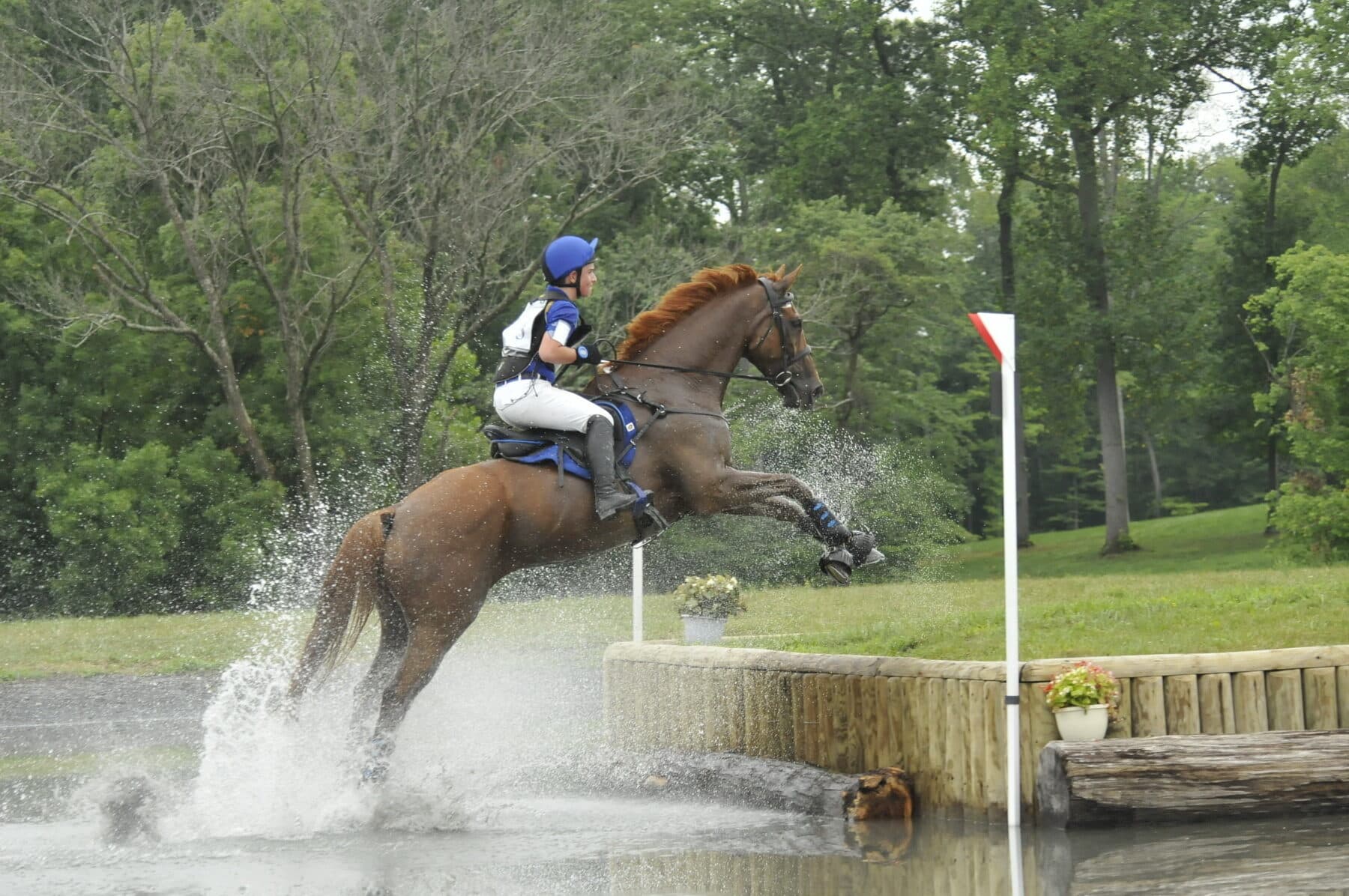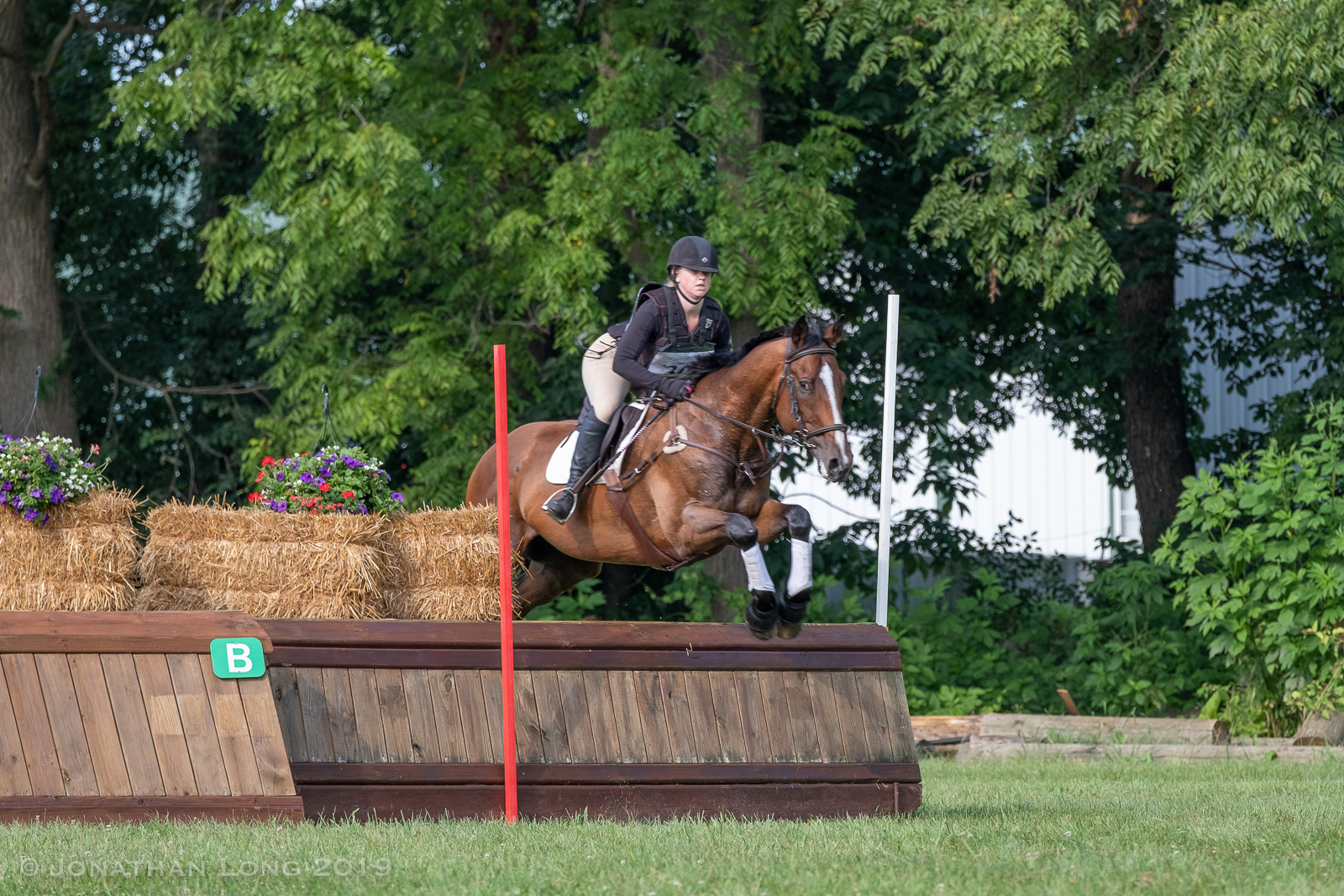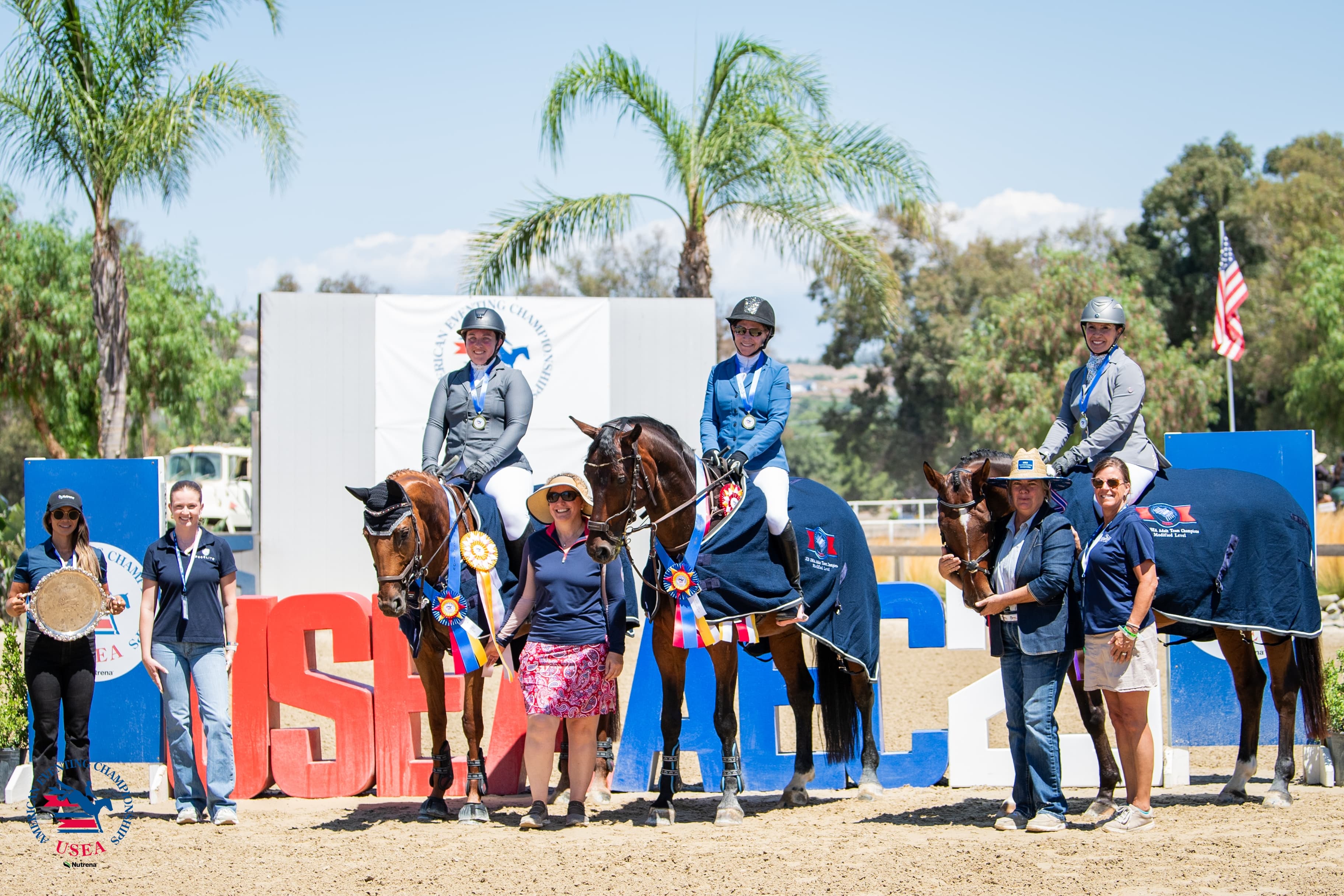Stanlaske and Weeks Conquer Charles Owen Technical Merit Awards at Cobblestone

The Charles Owen Technical Merit Award visits each of the 10 USEA Areas each year, presenting one junior and one adult amateur rider at the Training level with an award based on safe and effective cross-country riding. The Area VIII leg of the Charles Owen Technical Merit Award took place at the Cobblestone Farms Horse Trials, August 2-4, 2019. Noah Stanlaske and Michelle Weeks earned the junior and adult amateur awards, respectively.
Thirteen-year-old Noah Stanlaske and his own Chesterland (Innkeeper x Windsor Bonnet), a 12-year-old Thoroughbred gelding, were fourth after dressage in the Training Rider 2 division on a score of 29.6, to which they added a single rail in show jumping and no faults on cross-country to complete their weekend in fourth place on a score of 33.6.
When Stanlaske was 7 years old, his first-grade teacher sparked his interest in horses, and the rest was history. He started off riding at a hunter/jumper barn but went cross-country schooling with his Pony Club and got hooked on eventing. “I have been eventing for one year now and I absolutely love it,” Stanlaske shared. “I was lucky enough to spend some time in Ocala this past winter, training and working with some great professionals, and I’m really looking forward to going back next winter.”
Stanlaske stated that the professionals he has had the opportunity to work with have been very influential in her riding. “Blaine Orris has been instrumental in helping me develop my cross-country riding technique,” she said. “He has worked with and trained me in every aspect of learning how to ride over cross-country. I have also been fortunate enough to have worked with Bruce Davidson Sr. a little as well. I soak up as much as I can in those moments - what an honor to be able to learn from him. Tricia Dahms is another professional who has really helped my confidence with bigger questions.”
Stanlaske met his horse, “Chester,” through Bruce Davidson Sr., who bred and started him. “Chester and I have developed a great partnership and bond since we have been together,” Stanlaske said. “He is kind, willing, and trusting. He has taught me so much and we take care of each other. Chester gives 110 percent every time I get in the saddle. In the beginning of our relationship, he was a great teacher. Now we are strong together, we move together, and we anticipate each other’s movements. He’s my number one partner and my best friend. Chester is the horse that has not only helped to mold the rider who I have become, but he is the horse that has changed my life.”
Always looking to improve, Stanlaske said that receiving the score sheet from the judges helps him know what to wok on for next time. “I was very pleased with the feedback from the judge,” he said. “The judge noted that she thought I had a solid position and that Chester had great scope over jumps. I was happy to learn that the judge was able to see that I was successfully able to set Chester up balanced and properly for each obstacle. This experience was great validation for me that all of the work that the two of us have been doing is showing.”

Michelle Weeks and her partner Hugh Jackman (Outofthebox x Bea Ware) scored a 39.1 on the flat in the Open Training division, pulled two rails in show jumping, and added 6.4 time faults on cross-country to finish their weekend at Cobblestone in 10th place on a score of 53.5.
Weeks grew up around horses, with her mother teaching her and her older sisters how to ride. When Weeks was in middle school, she saw pictures of her eldest sister Misty eventing with her horse Sly, and knew she wanted to give it a try. It wasn’t until she was attending the Culver Girls Academy that she got her chance, and for her 16th birthday, she received her first horse – a flea-bitten grey Thoroughbred named Caesar.
Caesar went with Weeks to college and then law school, after which he retired to her parents' farm. Assuming she wouldn’t have the time to compete after college, Weeks planned to abandon riding for a time, but after meeting Philippa Humphreys and watching her compete in the Richland CCI3*, she knew she couldn’t give it up. “I ended up buying one of her sale horses she had just purchased off the track a month prior,” Weeks said. “Since then, I’ve been having fun working with him and all his quirks over the past six years.”
“Hughy,” as he is known in the barn, is a 12-year-old off-the-track Thoroughbred who raced until he was in his 6-year-old year under the name “Taylor B.” “Philippa purchased him from Doug and Terri Caracker who owned him when he raced at the Mount Pleasant, Michigan racetrack,” Weeks detailed. “I credit them for his wonderful disposition on the ground.”
In 2017, Weeks began working with Michelle and Pasha Zhuravlev, who she says helped her develop Hughy’s confidence on cross-country. “With their assistance, Hughy’s and my partnership, especially out on cross-country, has really manifested into something special where we can trust one another and really enjoy the experience.”
“In looking at the score sheet, I got the highest marks when it came to the preparation period, and the comment section indicated there was clear preparation before each of the systems,” Weeks shared. “[The judge] also noted that I had a good, tight position. I think the overall message I got in the feedback relayed to me and in viewing the score sheet was that I am in a good program right now with my trainers, Michelle and Pasha Zhuravlev, that has clearly done wonders for my riding and Hughy’s way of going on cross-country.”
“Given that normally cross-country is simply scored objectively, it is so encouraging to know that even from a subjective point of view, I am riding my horse well and he is enjoying his job. I am especially appreciative of the judge, Janice Holmes, who has a world of experience when it comes to judging the ability of riders from the lowest levels all the way to those riding at the five-star level. It means the world to me to know that in her opinion, I am riding correctly on a horse who is responding exceptionally well to the challenges presented to him. That is a great feeling that I will carry with me every time I enter a start box.”
“I’ve been eventing for the past 15 years on three different horses. Over time, on each horse, through a lot of trial and error, the biggest lesson I’ve had to keep on learning is that if I ‘talk less,’ he’ll ‘listen more,’” Weeks said. “What I mean by that is that there is a real temptation for me to just pick, push, and keep asking for adjustments all the way around the cross-country course. What would end up happening is that I’d have to give even ‘louder’ or more harsh commands to get the horse to pay attention when approaching a system. It was an exhausting way to ride cross-country for both horse and rider. Pasha is always telling me, ‘Trust him! He will jump!’ and he’s right. Hughy has developed into a confident and honest horse over the years. The last few times I’ve run cross-country, I did what I was told and let Hughy jump, only asking for adjustments when we approached systems requiring a little more attention. It worked wonders. Because I wasn’t messing with him through the whole course, he listened better when I did ask him to make adjustments and we were both less exhausted at the end. It reminded me of the trust I had built with my last two horses. It also reminded me of just how much fun it is to run cross-country!”
“I would just like to add that I am so grateful for the prizes awarded as a result of winning the Charles Owens Technical Merit Award, most of all for the brand new eventing vest,” Weeks said. “I have been using the same vest since I first started eventing 15 years ago, so it was definitely time to retire it. Thanks to Charles Owen’s sponsorship of this award, I will be able to do so. Thank you!”
“I think that the Charles Owen Technical Merit Award is a great experience because it lets the rider know not only what their strengths are, but where and how they can improve on cross-country,” Stanlaske concluded. “It’s a really valuable tool to promote proper form and safe riding in the sport of eventing. It was awesome to be a part of the experience, and I am thrilled to be the recipient of the Charles Owen Technical Merit Award.”
About the Charles Owen Technical Merit Award
In 2009, the Professional Horseman’s Council and Charles Owen founded the Charles Owen Technical Merit Award to reward juniors and adult amateurs for demonstrating safe and appropriate cross-country riding technique and educate riders and trainers as to what constitutes safe cross-country riding.
The Charles Owen Technical Merit Award is presented at one event in each of the 10 USEA Areas at the Training level to one junior rider and one adult amateur rider who have not competed at the Intermediate level or above. Every eligible rider at the Training level is automatically judged during their cross-country round and receives a score sheet with written comments, providing valuable feedback on their cross-country riding technique. ICP Certified Level III and IV Instructors, USEF licensed eventing officials, and USET Senior Team riders are all qualified to judge the Award. Click here to learn more about the Charles Owen Technical Merit Award.
The USEA would like to thank Charles Owen for sponsoring the Technical Merit Award.















